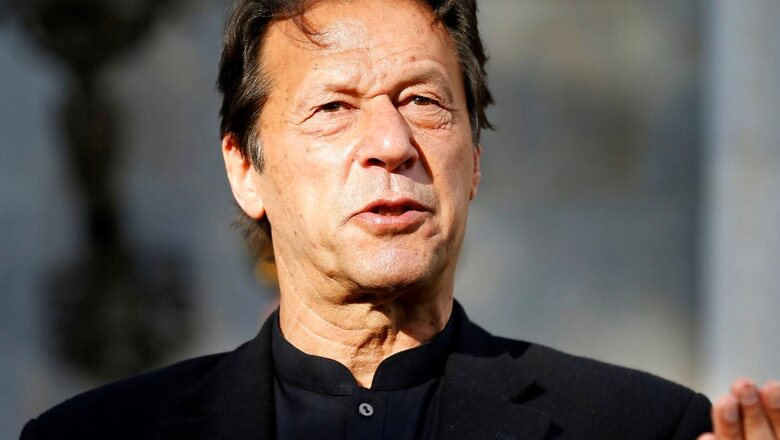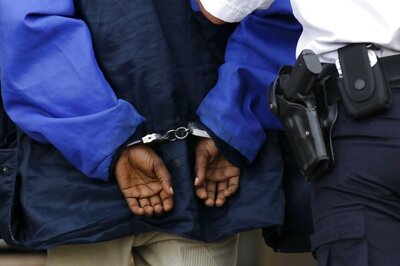
views
The air is rife with talk of a ‘regime change’ in Islamabad. Political pundits are predicting that the end of the disastrous Imran chapter is near. All the tell-tale signs of a government on its last legs are manifesting themselves: an opposition confident and smelling blood; allies of ruling party getting all skittish; drum-beaters of the regime in the media confessing to their ‘sins’ of rooting for the most inept government in Pakistan’s history; the media that was exercising self-censorship under government intimidation now finding its voice; sections of the judiciary and other institutions like Election Commission standing up against some of the steps being taken by the government; a restive public reeling under the impact of a collapsing economy; and most of all, the ‘selectors’—the Pakistan Army—are believed to be distancing themselves from the ‘selected’.
Everyone now seems to be waiting with bated breath for the denouement. It could come as early as today during the Joint Session of Parliament called by Imran Khan to ram through controversial bills aimed at rigging the next elections; or it could get postponed for a few days, weeks, perhaps even a month or two.
The finale of every season of Pakistan’s Game of Thrones is like one of those unending Balaji Telefilms soap operas with all the crazy twists and turns in a plot full of intrigue, deception and betrayal, and the usual last-minute surprise. Sometimes, the surprise lies in the protagonist pulling off a Houdini act; other times, the protagonist goes under. That Imran Khan is up a gum tree is quite clear. If he survives the current crisis it will not be because of anything he does at this stage, but more because of what his bête noire Nawaz Sharif doesn’t do—play ball with Imran’s principal backers sitting in the GHQ in Rawalpindi.
Simply put, ‘regime change’ in Islamabad is now in Nawaz Sharif’s hands. If Nawaz behaves pragmatically and reaches an understanding with the military establishment on the various steps leading up to the future political set-up, then Imran’s fate is sealed; if however, Nawaz Sharif remains obstinately ‘ideological’ about civilian supremacy, then he will end up giving Imran Khan another lease of life. The joint session today is going to be the Army’s way of telling Imran who his daddy is, and disabusing Nawaz of any fancy notions he might have of side-lining the military in the decision-making process and imagining that he is their only option.
A Game of Chicken
But in this game of Chicken, every side has some cards to play. The Pakistan Army needs a deal with the opposition to undo the disaster that Imran has visited upon Pakistan. It is unthinkable to see him run, nay ruin, Pakistan for another two years when his term ends. Nawaz Sharif is pushing the envelope because he thinks the Army is at its wits end over Imran and needs a deal with the opposition to fix the country. Imran thinks he has cards that will make things extremely messy for the Army if it tries to pull him down. He can sack the Army chief, he could dissolve the National Assembly, or take some other precipitate action that makes a pig’s breakfast of Pakistan’s politics. Even if none of that happens, Imran will be entitled to think that he is the only option that the Army has and that the occasional spat—like the one over the ISI chief appointment—will not change the dynamics of the military’s dependence on him, which will make him more obdurate.
It isn’t a big deal for the Pakistan Army to get rid of Imran Khan. The numbers aren’t stacked in his favour. But the Army would like to avoid a messy operation in which they aren’t sure of what will happen later. There are two broad matters that need to be settled. The first is an understanding of the next steps to get rid of Imran Khan, including what follows after he is ousted. The second is the future political road map, and the deal on who plays what part in the medium term i.e. post-elections.
According to the grapevine, neither of these matters have been settled and therefore the chances are that today’s Joint Session will be used by the military to send a signal to the opposition to get real. It will also be a signal to Imran that he survives on the military’s support.
The Googlies
While there is a broad understanding between the military and the opposition on an early election—first half of 2022 instead of last quarter of 2023—there are a number of loose ends to be tied up. If Imran Khan is voted out of office, will there be an in-house change in Islamabad or will the National Assembly be dissolved, a caretaker set-up put in office and fresh elections held by March 2022? If it is an in-house change, who will lead the next government? Will it be someone from the ruling PTI (Pakistan Tehreek-e-Insaf), will it be someone from PPP (Pakistan Peoples Party) or will it be some dark horse on which everyone agrees? Will this in-house change stay in office until the term of the National Assembly ends in August 2023 or will it just mind the shop, agree on a caretaker government and elections by March/April 2022? What happens to the provincial assemblies? Will they also be dissolved and go for elections along with the National Assembly? Pakistanis have some bug abut holding simultaneous elections to the national and provincial assemblies. Will they agree to having elections for the national and Punjab assemblies in 2022 and let the other provincial assemblies complete their term in 2023? Will the PPP, which has now been reduced to a provincial-level party, agree to an early election in Sindh? What about Khyber Pakhtunkhwa and Balochistan? None of these questions have been settled so far.
The other outstanding question is what happens after the elections in which Nawaz Sharif’s PML-N (Pakistan Muslim League-Nawaz) is expected to come out on top and form the next government? What role will Nawaz Sharif and his daughter Maryam play in that government? Nawaz Sharif is disqualified for life. Even if the corruption cases in which he and Maryam have been convicted are overturned because of a miscarriage of justice—there is enough evidence that these were Kangaroo courts—it will not end his disqualification which was on entirely different grounds.
The Army is not prepared to accept Maryam as Prime Minister. There is also no assurance as yet that Nawaz Sharif’s disqualification will be overturned by the Supreme Court. Chances are that a deal could be reached on Nawaz’s brother Shahbaz becoming the Prime Minister. He is someone who is a reasonably good administrator. More importantly, he is someone who never ever rubs the military the wrong way. But politically, Shahbaz just doesn’t have the kind of public support that Nawaz or Maryam enjoy. Will Nawaz allow Shahbaz a free hand in running the government or will he play back-seat driver and try to influence government policy, particularly on issues which the Army considers to be its domain? Will he insist on the Army stepping back from the political sphere before he agrees to a deal? Surely, even he knows that if the Army agrees to withdraw from political interference, it will only be a tactical retreat.
Will Nawaz Play Safe?
Even as the backroom deals are being worked out, there is speculation of Nawaz Sharif returning back to Pakistan to lead his party into action. But will he return while Imran is still in office? Seems unlikely, especially since Nawaz will go straight to jail after he lands in Pakistan. He was serving a jail sentence when he was sent abroad for medical treatment. The courts have now declared him a proclaimed absconder. Anyone who thinks that he will return and galvanise his supporters to do a Tehreek-e-Labbaik (TLP) kind of march that makes Imran Khan cower in fear and throw in the towel doesn’t know that the DNA of Nawaz Sharif’s party is not agitational. In any case, change in Islamabad will not come from the street but through palace intrigues, for which London is far more conducive than Lahore. Nawaz Sharif will return but probably only after he sees the back of Imran. Then, even if he has to go to jail, it will probably be a luxurious prison where he will stay a few months before the corruption cases under which he was convicted are declared a mistrial and he is released.
For now, just hang on to your seats and enjoy what seems to be the finale of Pakistani political soap opera’s latest season. But who knows if like a Balaji Telefilms show, the script writers will prolong the agony of the viewers by ending this episode in an anti-climax and the finale will come in the next episode.
The author is Senior Fellow, Observer Research Foundation. The views expressed in this article are those of the author and do not represent the stand of this publication.
Read all the Latest Opinions here



















Comments
0 comment